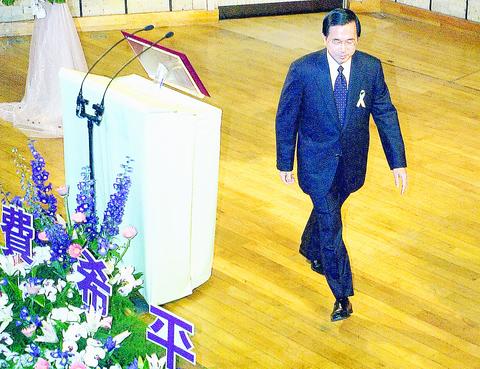The DPP and government heavyweights paid respects to late party stalwart and founding member Fei Hsi-ping (
President Chen Shui-bian (陳水扁) lauded the deceased former lawmaker for his judicious wording of the Taiwan independence clause contained in the DPP's charter.
"During the DPP's extraordinary National Delegation Congress in 1988, the party elite seriously argued the issue of whether to put the clause into the party's plat-form," Chen said in an address at Fei's funeral.

PHOTO: FANG PIN-CHAO, TAIPEI TIMES
Party officials praised Fei's achievements, saying he stood out as a "democratic pioneer" during a time of dictatorship.
"It was Fei, who sat beside me during the congress, who supported my idea of proposing an amendment called `the four ifs' to soften the impact of the clause," Chen said.
The clause listed four circumstances in which the DPP would declare the nation's independence: if the KMT negotiated with the Chinese Communist Party, if China invaded Taiwan, if the KMT government sold out Taiwanese interests, and if the KMT government refused to introduce real democracy and constitutional government.
Chen said that he proposed this amendment during the congress and that Fei's support was crucial to the reaching of a consensus in its favor.
Fei, a mainlander and a former KMT lawmaker who sided with opposition political groups to attack the KMT in the late 1970s, passed away on Feb. 21. He was 86.
Chen said that Fei was not only one of only a few mainlanders devoted to democratization but also a brave politician who confronted the autocratic regime with an instinctive understanding of right and wrong.
"Fei proved throughout his life that the pursuit of democracy, freedom and human rights can transcend ethnic lines," Chen said. "His career also ensured that the society of Taiwan will expect and admire a politician, whether Taiwanese or Chinese, if he speaks and behaves in accordance with justice and his conscience."
Vice President Annette Lu (呂秀蓮) praised the strength of character with which she said Fei fought the alien, autocratic KMT regime. Lu said the former regime should serve as a constant reminder to people who harbor unrealistic expectations of Beijing.
"The different attitudes toward China within Taiwan, with some hostile to China and others adopting the illusion that China is our friend, is the crux of the division within our country over the development of cross-strait relations," Lu said.
The DPP also praised Fei for the considerable assistance he provided to victims of political oppression. It said he was a true patriot unencumbered by ideology.
Fei was born in 1916 in China's Liaoning Province. He graduated from Beijing University and was elected as a legislator in 1948. He maintained the position for 42 years until 1990 when he retired.
During his political career, Fei repeatedly defended Lei Chen (
He campaigned for opposition politicians after the 1979 Kaohsiung Incident.
In 1986, Fei was elected to the DPP's Central Standing Committee.
But unable to identify with the party's march toward independence, Fei broke with the party in 1988. he withdrew from the political scene after moving to the US.

The brilliant blue waters, thick foliage and bucolic atmosphere on this seemingly idyllic archipelago deep in the Pacific Ocean belie the key role it now plays in a titanic geopolitical struggle. Palau is again on the front line as China, and the US and its allies prepare their forces in an intensifying contest for control over the Asia-Pacific region. The democratic nation of just 17,000 people hosts US-controlled airstrips and soon-to-be-completed radar installations that the US military describes as “critical” to monitoring vast swathes of water and airspace. It is also a key piece of the second island chain, a string of

A magnitude 5.9 earthquake that struck about 33km off the coast of Hualien City was the "main shock" in a series of quakes in the area, with aftershocks expected over the next three days, the Central Weather Administration (CWA) said yesterday. Prior to the magnitude 5.9 quake shaking most of Taiwan at 6:53pm yesterday, six other earthquakes stronger than a magnitude of 4, starting with a magnitude 5.5 quake at 6:09pm, occurred in the area. CWA Seismological Center Director Wu Chien-fu (吳健富) confirmed that the quakes were all part of the same series and that the magnitude 5.5 temblor was

Taiwan will now have four additional national holidays after the Legislative Yuan passed an amendment today, which also made Labor Day a national holiday for all sectors. The Chinese Nationalist Party (KMT) and Taiwan People’s Party (TPP) used their majority in the Legislative Yuan to pass the amendment to the Act on Implementing Memorial Days and State Holidays (紀念日及節日實施辦法), which the parties jointly proposed, in its third and final reading today. The legislature passed the bill to amend the act, which is currently enforced administratively, raising it to the legal level. The new legislation recognizes Confucius’ birthday on Sept. 28, the

The Central Weather Administration has issued a heat alert for southeastern Taiwan, warning of temperatures as high as 36°C today, while alerting some coastal areas of strong winds later in the day. Kaohsiung’s Neimen District (內門) and Pingtung County’s Neipu Township (內埔) are under an orange heat alert, which warns of temperatures as high as 36°C for three consecutive days, the CWA said, citing southwest winds. The heat would also extend to Tainan’s Nansi (楠西) and Yujing (玉井) districts, as well as Pingtung’s Gaoshu (高樹), Yanpu (鹽埔) and Majia (瑪家) townships, it said, forecasting highs of up to 36°C in those areas